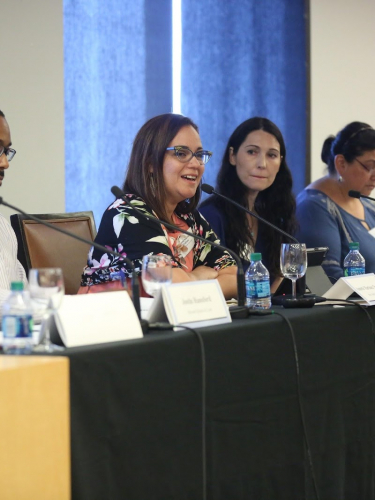
The Human Rights Institute builds the capacity of the BHRH Lawyers’ Network membership through an annual continuing legal education program focused on human rights in the United States. Past trainings have focused on The Convention on the Elimination of All Forms of Racial Discrimination; The International Covenant on Civil and Political Rights; the human rights to housing in the United States; advocating for human rights in state courts; ethics and domestic human rights lawyering; and engaging with U.N. human rights mechanisms. The CLE trainings are open to all.
Past CLE Programs
Friday, May 1, 2020
Co-Sponsors
- The Center for Constitutional Rights
- Columbia Law School Human Rights Institute
- The Leadership Conference on Civil and Human Rights
- New York City Commission on Human Rights
- Northeastern Program on Human Rights and the Global Economy
- CUNY International Human Rights & Gender Justice Clinic
- Social Justice Initiatives (SJI)
- US Human Rights Network
- Columbia Law School Human Rights Law Review
Event Description
The Columbia Law School Human Rights Institute (HRI) convened more than 200 lawyers, organizers, activists, and government representatives to explore how core human rights concepts of dignity, equality, and accountability are shaping remedies for racial justice in the U.S. Symposium speakers discussed strategies to secure reparations and restorative justice, sharing perspectives from traditional litigation, legislative and policy initiatives, and movement-centered advocacy that draws on international human rights standards and indigenous practices.
“We are coming together at a time when the need for solidarity, community, and collective action couldn’t be clearer,” said JoAnn Kamuf Ward, Director of HRI’s Human Rights in the U.S. Project, introducing the event. “COVID-19 exposes us to the deep need for a new approach to policymaking and governance that reckons with the historical and ongoing discrimination that permeates all aspects of American life. We must prioritize societal repair because it is clear that the social contract that we all need, and deserve, is broken.”
The 2020 virtual symposium provided a unique forum for lawyers and advocates to share strategies for organizing, communications, and legislative change that redefine justice, expand available remedies, and center healing and inclusion to tackle discrimination, bias, and persistent inequality. Speakers from the International Center for Transitional Justice, the Leadership Conference on Civil and Human Rights, the Movement for Black Lives, the New York City Commission on Human Rights, the Center for Constitutional Rights, and the Center for Court Innovation, among others, discussed how to leverage core human rights principles to forge institutions and approaches that foster equity.
“In our work, we conceptualize that social healing is the central organizing principle of restorative justice," said Margaret Burnham, Director of the Civil Rights and Restorative Justice Project at Northeastern School of Law. Her keynote remarks emphasized the importance of truth-telling and acknowledgment of wrongs in restoring dignity to victims of historical violence and trauma. Burnham’s remarks recounted that while significant strides have been made to advance legal equality, structural injustice and systemic harms remain largely unaddressed in the United States. She underscored that “we need to demand a full accounting,” and that the “themes of transitional justice, as reinforced by human rights instruments… offer a framework within which to combat amnesia about the past and anchor struggles for justice.”
The first panel, entitled “Foundational Concepts of Remedies and Reparations for Racial Injustice from Global and National Practice,” distilled international human rights norms that define state obligations and require acknowledgment, accountability, redress, and compensation for rights violations. Speakers drew from examples in Argentina, South Africa, Kenya, and the Philippines, as well as national and local U.S. advocacy to highlight concrete pathways to remediate past wrongs and eliminate laws and practices that perpetuate racism and inequity. “There is no wrong without a remedy,” said Wade Henderson of the Leadership Conference on Civil and Human Rights. “Equity is an incredibly important part of our constitutional obligation, and key to fulfilling the rights of those who have been injured.” Panelists discussed the transformative potential of the law, as well as the limits of a strictly legal approach, and emphasized the power of movement-lawyering and community-center advocacy.
The second session, entitled “Restorative Justice in Practice: Pathways to Racial Justice at the Local Level,” explored how advocates and city governments are operationalizing human rights in restorative justice initiatives to improve health equity, abolish the foster care system, and deliver justice when wrongs do occur. Panelists discussed initiatives that center the perspective of individuals most impacted by rights violations, emphasized indigenous peace-making principles that drive this work, and explored the transformative potential of participatory justice. Key themes included the importance of shifting power and building initiatives that affirmatively foster inclusion and the prioritization of community needs in order to address structural causes of harm.
Conference Agenda & Recordings
- Welcome: JoAnn Kamuf Ward, Director, Human Rights in the US Project, Columbia Law School Human Rights Institute
- Keynote Remarks: Margaret Burnham, University Distinguished Professor of Law and Director, Civil Rights and Restorative Justice Project, Northeastern School of Law
This foundational discussion distilled key concepts related to restorative justice, and components of reparations, and their role in advancing the rights to equality and non-discrimination. Speakers highlighted the role that government institutions can and are playing in advancing racial justice, drawing from the United States, as well as global principles and practice. Panelists introduced key human rights principles and highlighted how current national and transnational advocacy aims to redress past wrongs and eliminate laws and practices that perpetuate racism and inequity.
Panelists:
- Ruben Carranza, International Center for Transitional Justice
- Wade Henderson, Leadership Conference on Civil and Human Rights
- Monifa Bandele, Movement for Black Lives
- Justin Hansford, Howard University School of Law Thurgood Marshall Center for Civil Rights
Moderator: Nadia Ben Yousef, Center for Constitutional Rights
Session II: Restorative Justice in Practice: Pathways to Racial Justice at the Local Level
This session explored how core human rights principles are currently being operationalized in restorative justice initiatives that strengthen the enjoyment of economic and social rights, including housing, health, and education. Panelists discussed the role of partnerships between community organizations and government, approaches that center the perspective of communities most impacted by rights violations, and explored the transformative potential of participatory justice.
Panelists:
- Brett Taylor, Center for Court Innovation
- Carmelyn P. Malalis, New York City Commission on Human Rights
- Ivelyse Andino, Radical Health/Gender Equity Commission
- Erin Miles Cloud, Movement for Family Power Child
- Erika Sasson, Center for Court Innovation
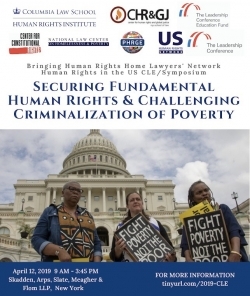
Friday, April 12, 2019
Hosted by:
- Skadden, Arps, Slate, Meagher & Flom LLP
Co-Sponsors:
- Columbia Law School Human Rights Institute
- Center for Constitutional Rights
- National Law Center on Homelessness and Poverty
- Northeastern Law School Program on Human Rights and the Global Economy
- US Human Rights Network
- NYU School of Law Center for Human Rights and Global Justice
- Leadership Conference Education Fund & Leadership Conference on Civil and Human Rights.
Event Description
The Columbia Law School Human Rights Institute (HRI) gathered over 100 lawyers, organizers, and government representatives from across the United States to strategize how to address laws and policies that perpetuate poverty and articulate a positive vision for change. The full-day event marked the 16th symposium on human rights in the United States. The program featured panels addressing the right to housing, leveraging human rights standards and strategies to ensure fulfillment of basic needs, including water, sanitation, and a healthy environment, and strategies to respect and promote health and well-being of pregnant people and mothers. Local, national, and international perspectives informed every session, and key themes were how criminalization exacerbates the negative impacts of poverty and leads to disparities across a range of social indicators, as well as the ways in which punitive approaches destabilize families and communities.
Conference Agenda
9:30 a.m. – 9:45 a.m. – Welcome & Overview
- JoAnn Kamuf Ward, Director, Human Rights in the US Project, Columbia Law School Human Rights Institute
9:45 a.m. – 10:15 a.m. – Opening Remarks
-
Dr. Rosalee Gonzalez, Executive Director, US Human Rights Network
-
Introduced by Jamil Dakwar, Director, ACLU Human Rights Program
-
10:15 a.m. – 11:30 a.m. – Session I: Criminalization of Homelessness & the Right to Housing
Focusing on the case study of criminalization of homelessness, this opening panel will highlight how local and national organizations have used an array of human rights standards and strategies in advocacy, organizing, and litigation to challenge the criminalization of homelessness. Speakers will discuss the human rights law and principles that inform this work, identify specific ways to bring human rights into domestic policy spaces and movement-building, and discuss specifically how engagement with UN treaty bodies and independent experts has been used to move the needle to advance the right to housing.
Panelists:
-
Eric Tars, Legal Director, National Law Center on Homelessness & Poverty
-
Pete White, Executive Director & Founder, LA CAN
-
Erik Steinecker, Policy Analyst, Department of Housing and Urban Development
-
Sandra Contreras, NYC Right to Counsel Coalition
Moderator:
-
Jennifer Turner, Researcher, ACLU Human Rights Program
11:30 a.m. – 11:45 a.m. Break
11:45 a.m. – 1:00 p.m – Session II: Leveraging Human Rights Standards & Strategies to Ensure Fulfillment of Basic Needs
The ability to enjoy an adequate standard of living free from discrimination is a bedrock of human rights. Laws and policies that criminalize activities of daily life and penalize the inability to afford basic services contravene core economic and social rights protections and deprive individuals of basic needs, including in the arenas of water, sanitation, and health. Increasingly federal, state and local policy seek to deter access to basic social protections and stigmatize recipients of public services, with a disproportionate impact on communities of color living in poverty. These efforts violate principles of equality and non-discrimination, with impacts on the full range of human rights. This session will explore how the human rights framework can be used to analyze and challenge laws that curtail access to a social safety net, and penalize individuals who seek to engage in daily activities, such as driving or receiving public benefits. Panelists will discuss the short and long term impacts of criminalization, highlight emerging human rights strategies to raise the visibility of key community concerns, forge partnerships, and center the perspective of communities most impacted by rights violations.
Panelists:
-
Brittany Thomas, Legal Fellow, Center for Constitutional Rights
-
Catherine Flowers, Rural Development Manager, Equal Justice Initiative
-
Holly T. Bird, HTBird PLLC
-
Michelle Cook, Founder, Invest, Divest, Protect
-
Jovana Renteria, Puente Human Rights Movement
Moderator:
-
Natasha Lycia Ora Bannan, Associate Counsel, Latino Justice PRLDEF
1:00 p.m - 1:15 p.m: Break
1:15 p.m - 2:15 p.m. – Lunchtime Keynote
-
Andrea Ritchie, Researcher-in-Residence on Race, Gender, Sexuality and Criminalization, Barnard Center for Research on Women
-
Introduced by Nahal Zamani, Advocacy Program Manager, Center for Constitutional Rights
-
2:15 p.m. – 3:30 p.m. – Session III: Strategies to Respect and Promote the Health & Well-being of Pregnant People & Mothers
Across the country, women have been prosecuted for ending, allegedly causing harm, or merely risking harm, to their own pregnancies. Punitive child welfare practices further undermine rights to health, privacy for families. Existing laws and enforcement schemes violate rights to equality and autonomy and undermine public health goals. Lawyers and organizers have engaged with human rights standards and mechanisms to highlight the interrelated rights violations that pregnant people and families experience, as well as the how these laws impact women differently on the basis of their identities. Panelists will explore the human rights principles that motivate their work, discuss work with UN Special Procedures, and Treaty Bodies, and share how this engagement informs advocacy and litigation.
Panelists:
-
Farah Diaz Tello, If/When/How: Lawyering for Reproductive Justice
-
Carrie Eisert, Policy Adviser, Amnesty International
-
Kara Wallis, Attorney, Bronx Defenders
-
Pilar Herrero, Senior Staff Attorney, Center for Reproductive Rights
Moderator:
- Cindy Soohoo, Director, International Human Rights and Gender Justice Clinic, CUNY Law School
3:30 p.m. – 3:45 p.m. – Closing Remarks
- Nikki Reisch, Legal Director, NYU School of Law Center for Human Rights and Global Justice
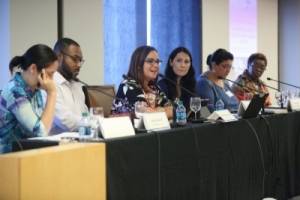
June 1, 2018
One Liberty Plaza, New York, NY
Hosted by:
- Cleary Gottlieb Steen & Hamilton LLP
Co-sponsored by:
- ACLU
- Columbia Law School Human Rights Institute
- Center for Constitutional Rights
- Center for Reproductive Rights
- Latino Justice PRLDEF
- US Human Rights Network
- University of Pennsylvania Transnational Legal Clinic
Event Description
The Symposium, Advancing Racial Justice and Human Rights: Rights Based Strategies for the Current Era, aimed to develop U.S. lawyers’ understanding of opportunities and challenges in implementing human rights principles of non-discrimination, equality, and participation. It was also a space to evaluate lessons learned from the successes achieved by the domestic human rights movement over the past two decades, and to chart a path forward at a time when human rights standards are permeating movement building, litigation, and policy advocacy to address individual and structural racism and discrimination.
Conference Agenda
9:15 – 9:30 A.M. – Welcome
- JoAnn Kamuf Ward, Director, Human Rights in the US Project, Columbia Law School Human Rights Institute
9:30 – 10:00 a.m. – Opening Remarks
- Todd Cox, Director of Policy, NAACP Legal Defense and Educational Fund, Inc.
10:00 – 11:15 A.M. – SESSION I: OVERVIEW OF LEGAL FRAMEWORK & CORE PRINCIPLES
This introductory panel will introduce the normative basis for addressing racial justice through an international human rights lens. Panelists will explore how human rights norms and principles can complement U.S. legal protections, and the renewed emphasis on human rights in the current political context. Speakers have engaged in diverse efforts to address migrants’ rights, challenge state use of force, advance gender and economic justice, promote access to education, and mobilize collectively for international accountability. Drawing from these efforts, the speakers will highlight the elements of an inclusive, rights-based approach to advocacy, and the strengths and limitations of using human rights discourse and strategies to advance social justice.
Panelists:
- Lisa Crooms-Robinson, Professor of Law, Howard University School of Law
- Roxanna Altholz, Assistant Clinical Professor of Law, Berkeley International Human Rights Clinic
- Farah Tanis, Executive Director, Black Women’s Blueprint
Moderator: Jamil Dakwar, Director, ACLU Human Rights Program
11:15– 11:30 P.M. – Break
11:30 – 1:00 P.M. – SESSION II: STRATEGIES FOR EFFECTIVE INTERNATIONAL ENGAGEMENT & LEVERAGING SUCCESS DOMESTICALLY
This session will emphasize how a rights-based approach holds the potential to raise the visibility of key community concerns, foster strong partnerships, and enhance accountability. Panelists will also discuss ways to effectively use human rights standards and strategies, including through engagement with regional and international mechanisms, in advocacy to advance racial justice in the United States. The panel will cover advocacy on a range of issues, including police violence, maternal health, voting, the right to water, and economic justice in Puerto Rico. Drawing on such advocacy, this session will explore approaches to centering the voice of individuals and groups impacted by human rights violations, and share how human rights-based claims, as well as the results of international engagement, can be a component of policy-advocacy and movement building.
Panelists:
- Justin Hansford, Associate Professor of Law & Executive Director, Thurgood Marshall Civil Rights Center
- Annette Martinez-Orabona, Director, Human Rights Clinic, Universidad Interamericana en Puerto Rico
- Pilar Herrero, Human Rights Counsel, Center for Reproductive Rights
- Sylvia Orduno, Michigan Welfare Rights Organization
- Marcia Johnson Blanco, Co-director, Voting Rights Project, Lawyers’ Committee for Civil Rights Under Law
Moderator: Cindy Soohoo, Director, CUNY School of Law Human Rights & Gender Justice Clinic
1:15-1:30 P.M. – Break
1:30 – 2:30 P.M.. – Lunch & Keynote
- Catherine Lhamon, Chair, United States Civil Rights Commission
- Introduced by Robin Toma, Executive Director, Los Angeles County Human Relations Commission
2:30-4:00 P.M. – ROUNDTABLE: RESPONDING TO EMERGING THREATS WITH RIGHTS-BASED APPROACHES
This roundtable will explore the threats and challenges posed by the current political environment, and the opportunities for new strategies and alliances. What role do, and can, human rights play in addressing both the increasingly urgent threats facing communities of color, and people living in poverty, as well as persistent forms of discrimination? How do we build the strength and collective power of the domestic human rights movement in light of current challenges we face? What role can lawyers play?
Speakers:
- Nicole Austin-Hillery, Executive Director US Program, Human Rights Watch
- Chase Iron Eyes, Counsel for the Dakotas, Lakota People’s Law Project
- Baher Azmy, Legal Director, Center for Constitutional Rights
- Meena Jagannath, Co-founder, the Community Justice Project
Moderator: Natasha Bannan, Associate Counsel, LatinoJustice PRLDEF
4:00 – 4:20 P.M. – CLOSING REMARKS
- Rosalee Gonzalez, Acting Director, US Human Rights Network
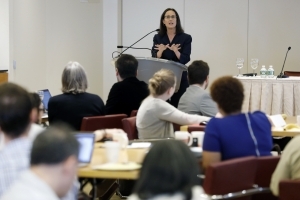
Friday May 19, 2017
Skadden, Arps
Co-sponsored by:
- Columbia Law School Human Rights Institute
- Columbia Human Rights Law Review
- Northeastern University School of Law, Program on Human Rights and the Global Economy
- National Economic and Social Rights Initiative
Event Description
The 2017 Bringing Human Rights Home Lawyers’ Network annual CLE brought together more than 100 U.S. lawyers, law students, academics, and other international human rights experts to discuss strategies for localizing human rights in the U.S. The 2017 symposium/CLE program explored the relevance and challenges of state and local implementation of human rights, specific strategies for effective and creative implementation, including the women's rights treaty, the role of state courts, and advocacy for the right to water and sanitation in local campaigns.
Conference Agenda
9:30 – 9:45 a.m. – Welcoming Remarks
- Risa Kaufman, Executive Director, Columbia Law School Human Rights Institute
9:45 – 10:30 a.m. – Introductory Keynote Remarks and Q&A
- Attorney General Lisa Madigan, Illinois State Attorney General
- Introduced by JoAnn Ward, Deputy Director, Human Rights in the U.S. Project, Columbia Law School Human Rights Institute
10:30 – 11:45 A.M. Session I: The Renewed Relevance of Human Rights at the State and Local Level
State and local governments play a significant role in bringing the United States into compliance with its international human rights commitments. Lawyers and advocates are initiating, encouraging, and promoting these efforts and developing new strategies to “bring human rights home.” This introductory panel will explore the relevance and challenges of state and local implementation of human rights in the United States, particularly in light of the current political landscape; domestic and international comparative approaches to subnational human rights implementation; the role of the federal government in facilitating and supporting state and local human rights implementation; and the critical importance of working in close partnership with impacted communities.
Panelists:
- Martha Davis, Professor of Law, Northeastern University School of Law, and Co-director, Program on Human Rights and the Global Economy
- Cathy Albisa, Executive Director, National Economic and Social Rights Initiative, and Commissioner, New York City Human Rights Commission
- Michele Grigolo, Lecturer in Sociology, School of Social Sciences, Nottingham Trent University
- Olatunde Johnson, Professor of Law and Vice-Dean for Intellectual Life, Columbia Law School
- Meredith Johnston, Attorney-Adviser, Office of the Legal Adviser for Human Rights and Refugees (L/HRR), U.S. Department of State
Moderator: JoAnn Ward, Deputy Director, Human Rights in the U.S. Project, Columbia Law School Human Rights Institute
11:45 a.m.– 12:00 p.m. Break
12:00 p.m. – 1:00 p.m. Session II: Strategies For Effective State and Local Implementation of Human Rights: Bringing Women’s Rights Home
This session will explore specific strategies for effective and creative implementation of human rights at the state and local level, with a particular focus on women’s rights, including local implementation of the women’s rights treaty, CEDAW.
Panelists:
- June Zeitlin, Director of Human Rights Policy, Leadership Conference on Civil and Human Rights
- Yolanda Francisco-Nez, Director, Mayor’s Office of Diversity and Human Rights, Salt Lake City, Utah
- Krishanti Dharmaraj, Executive Director, Center for Women’s Global Leadership at Rutgers, the State University of New Jersey
- Caroline Bettinger-López, Professor of Clinical Legal Education, Director, Human Rights Clinic, University of Miami School of Law
Moderator: Debra Liebowitz, Professor of International Relations and Women’s & Gender Studies, and the Associate Dean for Curriculum and Faculty Development, Drew University
1:00 – 2:00 p.m. Lunch (provided) & Remarks from Robin Toma
- Robin Toma, Executive Director, Los Angeles County Human Relations Commission
2:00 – 3:00 p.m. Session III: Litigating Human Rights, Session IV: Leveraging Successes and Addressing Challenges, and Closing Remarks
In this session, panelists will discuss the role that state courts can play in ensuring U.S. compliance with human rights, with a particular focus on strategies, successes, and challenges of integrating international human rights law into state court litigation.
- Hon. Kristin Booth Glen, former New York County Surrogate Court Judge, and Dean Emerita, Professor of Law, CUNY School of Law
- Johanna Kalb, Associate Professor of Law, Loyola University New Orleans College of Law
- Wilhelm H. Joseph Jr., Esq., Executive Director, Maryland Legal Aid
Moderator: Steven Watt, Senior Staff Attorney, ACLU Human Rights Program
3:00 – 3:15 Break
3:15 – 4:30 Session IV: Leveraging Successes and Addressing Challenges: Local Human Rights Advocacy for Water and Sanitation
Advocates for the right to water and sanitation have had particular success by drawing on international human rights standards and engaging with international and regional human rights mechanisms. Panelists in this session will explore human rights advocacy for the right to water and sanitation in local campaigns in Detroit, Michigan, rural Alabama, and California.
- Inga Winkler, Lecturer, Institute for the Study of Human Rights, Columbia University
- Catherine Flowers, Rural Development Manager, Equal Justice Initiative & Alabama Center for Rural Enterprise Community Development Corporation, and Director of Environmental Justice and Civic Engagement, Center for Earth Ethics
- Alice Jennings, Edwards & Jennings, Detroit, Michigan
Moderator: Cindy Soohoo, Director, International Human Rights Gender Justice Clinic at CUNY School of Law
4:30 – 4:45 p.m. Closing Remarks
- The Honorable William Bell, Mayor of the City of Birmingham
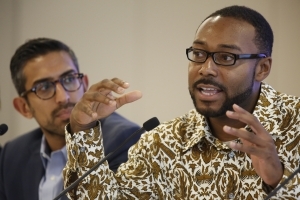
Friday June 24, 2016
Skadden, Arps
Co-sponsored by:
- American Civil Liberties Union
- National Economic and Social Rights Initiative
- Center for Reproductive Rights
- National Law Center on Homelessness and Poverty
Event Description
The 2016 Bringing Human Rights Home Lawyers’ Network annual CLE brought together more than 100 U.S. lawyers, law students, academics, and other international human rights experts to discuss approaches to advancing U.S. social justice advocacy through engagement with UN human rights experts. Panelists explored the opportunities that the special procedures offer to raise the profile of U.S. human rights concerns and advance advocacy efforts to address them. The 2016 symposium/CLE program used examples involving advocacy with the UN special procedures on U.S-related issues including the right to water, criminalization of homelessness, solitary confinement, access to reproductive healthcare, and discriminatory policing practices, among others.
Recordings
- Welcoming Remarks and Introductory Keynote
- Session I: Overview of the UN Special Procedures Mechanism
- Session II: Strategies for Effective Enagagement
- Lunch Keynote Conversation
- Session III and Closing Remarks
The conference agenda is available here.
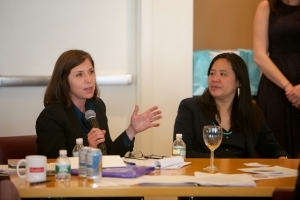
Friday June 12, 2015
Skadden, Arps
Co-sponsored by:
- Center for Justice and International Law (CEJIL)
- International Justice Resource Center
- American Civil Liberties Union
- Robert F. Kennedy Human Rights
- University of Pennsylvania Transnational Legal Clinic
Event Description
The 2015 Bringing Human Rights Home Lawyers’ Network annual CLE brought together practitioners and experts to discuss advocacy strategies for engaging with the Inter-American Human Rights System in the United States. Panelists explored the doctrinal and structural framework of the IACHR and examined case studies on a range of issues, including detention, economic and social rights, and women’s rights. The 2015 symposium/CLE program used examples from the U.S. and the Americas to demonstrate how human rights advocates might improve the efficacy of the Inter-American Human Rights System, and deepen the impact of their advocacy.
The conference agenda is available here.
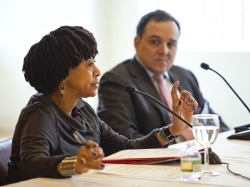
Friday May 2, 2014
Skadden, Arps
Co-sponsored by:
- Columbia Law School's Human Rights Institute
- Northeastern Law School's Program on Human Rights & the Global Economy
- Poverty & Race Research Action Council
- American Civil Liberties Union
- NAACP Legal Defense Fund
- The Leadership Conference on Civil and Human Rights
Event Description
The 2014 Bringing Human Rights Home Lawyers’ Network annual CLE on domestic human rights focused on the 20th anniversary of U.S. ratification of the Convention on the Elimination of All Forms of Racial Discrimination (CERD). The full day symposium brought together over 100 lawyers and advocates to discuss the history of the treaty and explore strategies for engaging with the U.S. government and the CERD Committee around the treaty body's August 2014 review of U.S. compliance.
The conference agenda is available here.
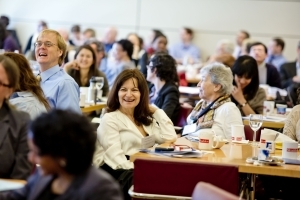
Friday April 26, 2013
Skadden, Arps
Co-sponsored by:
- Columbia Law School's Human Rights Institute
- National Law Center on Homelessness and Poverty
- Northeastern Law School's Program on Human Rights & the Global Economy
Event Description
U.S. lawyers are increasingly engaging international human rights law and strategies in their domestic social justice advocacy efforts. A strength of the human rights framework is its ability to address the intersection of economic, social, cultural, civil and political rights. Yet pursuit of economic and social rights presents special challenges in the U.S. legal context. This symposium explores strategies for advancing economic and social rights advocacy in the U.S., focusing in particular on the right to housing. Participants will examine legal developments pertaining to the right to housing and related rights, both internationally and in the U.S. And, drawing on international human rights, participants will explore promising approaches to establishing the right to housing in U.S. courts and through other advocacy efforts.
Click here to view the conference agenda.
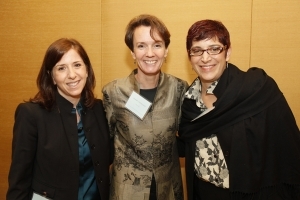
Friday March 16, 2012
Skadden, Arps
Co-sponsored by:
- Columbia Law School's Human Rights Institute
- American Civil Liberties Union
- University of Pennsylvania School of Law Transnational Legal Clinic
Event Description
The United States ratified the International Covenant on Civil and Political Rights (ICCPR) in 1992. As the U.S. government and civil society prepare for the fourth periodic review of the United States’ compliance with its obligations under the covenant, this program will examine the history and impact of U.S. ratification and engagement with the U.N. Human Rights Committee, which monitors its compliance with the covenant, and will look ahead at the possibilities for ensuring U.S. accountability for its human rights commitments.
Click here to view the conference agenda.
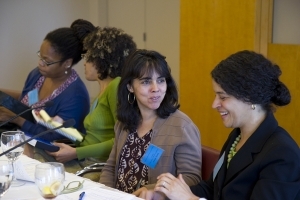
Friday June 3, 2011
Skadden, Arps
Co-sponsored by:
- Columbia Law School's Human Rights Institute
- Human Rights Watch
- American Civil Liberties Union
- United Nations Association of the USA
Event Description
This program explored strategies for U.S. lawyers to effectively engage with UN human rights mechanisms as a means of furthering domestic social justice advocacy efforts. Participants received a grounding in the international human rights system and mechanisms as well as an understanding of strategies for engagement with civil society and government and challenges of local implementation and follow-up.
Click here to view the conference agenda.
Friday June 4, 2010
Skadden, Arps
Co-sponsored by:
- Center for Constitutional Rights
- Center for Reproductive Rights
- National Economic and Social Rights Initiative
This training explored whether and how adoption of a human rights framework in the domestic advocacy setting shapes a lawyer’s ethical responsibilities.
Click here to view the conference agenda.
April 17, 2009
Skadden, Arps
Co-sponsored by:
- Northeastern Law School, Program on Human Rights in the Global Economy
- National Economic and Social Rights Initiative
- Association of the Bar of the City of New York, Social Welfare Committee
- The American Society of International Law
This training explored the use of transnational standards in developing state law jurisprudence to protect economic and social rights such as health and housing, as well as non-litigation human rights legal strategies in advocating for economic justice.
Click here to view the conference agenda.
April 7, 2008
Skadden, Arps
Co-sponsored by:
- Center for Justice and International Law
- American Society for International Law
When advocacy in civil and human rights cases is unsuccessful in U.S. courts, lawyers sometimes turn to the Washington, D.C. based Inter-American Commission on Human Rights (IACHR) as an alternate forum to air their clients’ grievances. This CLE training focused on how this tribunal affects U.S.-based advocacy.
Click here to view the agenda.
April 19, 2007
Columbia Law School
Co-sponsored by:
- Northeastern Law School, Program on Human Rights in the Global Economy
- The American Society of International Law
Over the past few terms, the Supreme Court and other U.S. courts have shown a growing interest in comparative foreign law arguments. This all day CLE program was designed for domestic public interest lawyers considering when and how to incorporate foreign sources into domestic litigation and advocacy. The program provided an overview of the Supreme Court’s use of foreign law, considered the controversy and debate around the use of such sources arguments, and examined case studies of legal strategies using foreign sources. The session concluded with a skill-building session on how to conduct foreign law research.
Experts on the use of foreign legal sources led the sessions, providing insight into judicial attitudes towards such sources and strategic considerations in their use in different U.S. forums.
Click here to view the conference agenda.
